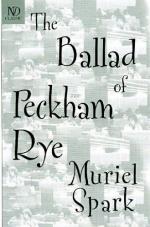|
This section contains 1,211 words (approx. 5 pages at 300 words per page) |

|
Muriel Spark's major concern in The Ballad of Peckham Rye—as in many of the rest of her novels and short fiction—is the problem of class and class-consciousness and its effect on morality and the relations between the sexes. Though Spark has claimed not to be a very political writer, this novel nevertheless concentrates on the disastrous effects of class and economics on love and morality. It begins with an account of a jilted bride, Dixie Morse, a workingclass girl who is obsessed with living in a model bungalow after her marriage. The novel ends almost precisely where it begins; what happens in between is a humorous, fanciful, and highly satirical flashback of sorts, explaining, in a roundabout way, what brought about the jilting. In the process, "upper-middle-" and "lower-working" class values alike fall prey to Spark's scathing and witty critique.
A convert...
|
This section contains 1,211 words (approx. 5 pages at 300 words per page) |

|




